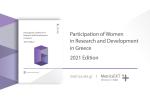
The National Documentation Centre (EKT) has presented its new publication under the title 'Documenting Public Policies. Monitoring and Evaluation Mechanism of 4 Actions of the OP 'Human Resources Development, Education & Lifelong Learning 2014-2020'. The aim of the publication is to highlight a good, national-wide practice that introduces a comprehensive approach on planning, implementing, monitoring and re-planning public policy and relevant policy interventions that constitute a new generation of funding initiatives and calls that aim, for the first time, to support directly young scientists and researchers, so as to: a) cultivate young scientists’ further skills, b) tackle the brain drain phenomenon, and c) contribute to the scientific human capital renewal of the main bodies of the research and academic ecosystem of the country.
The publication presents a particular case study that is based on EKT’s activity during the programming period 2014-2020 for monitoring and assessing the NSRF Actions 2014-2020 that support young scientists and researchers, hosted by public research centres and higher education institutes (HEIs). This particular category of public policy measures repopulates Greek HEIs with adjunct teaching personnel and contributes to efforts for strengthening national research production attributed mainly to young researchers.
Thus, for EKT, the main focus of this publication and the broader study of this area is to highlight policy measures that support highly qualified and specialised human resources, that are considered to be a critical parameter for the country, towards its productive modernisation and an alternative, sustainable growth model for the post-crisis period.
For the purposes of this activity, EKT has followed a holistic approach for the preparation and operation of a relevant monitoring and assessment mechanism for all policy measures that were funded by the 2014-2020 National Strategic Reference Framework to support post-doc research, PhD candidates and new research teams, addressing to all beneficiaries, who participated in these projects, funded by the Special Secretariat for the Management of European Social Fund Programmes (Ministry of Development and Investment). It is noteworthy that from the first call, in 2016, until the end of 2020, the total number of teaching and research positions amounted to 6,659, corresponding to 4,675 unique beneficiaries.
In addition to the presentation of this case study, this publication highlights a specific approach to public policy design, which lays emphasis on evidence-based policy, in order to enhance public policies’ efficiency and effectiveness, especially in cases of funding initiatives that contribute to broader development strategies and growth (such as Smart Specialisation Strategy, the broader Partnership Agreement between Greece and EU, the Digital Transformation Strategy 2020-2025, or interventions under the Greek Recovery and Resilience Plan 'Greece 2.0'.
As a matter of fact, presenting EKT's activity in the area of monitoring and assessing public policy interventions provides an empirical case for the broader concept of decision-making and implementing public policy on the basis of quantitative data and true evidence. In more detail, the aim is to highlight the development and operation of the monitoring mechanism that relies on indicators setting, and production of data, policy insights and visualised summaries.
This material supported further documentation, as it provided data, factual analysis, etc., that were deemed necessary for monitoring the above mentioned Actions. These activities contributed decisively to the creation and implementation of the well-known “policy-cycle” that provides feedback to policy makers, in order to be able to plan, implement, monitor, re-design and revise public policy interventions.
For the purposes of this task, EKT provided to the Special Secretariat for the Management of European Social Fund Programmes reports and deliverables, dealing with methodological guidelines, and relevant reports-deliverables for monitoring each round of calls, as well as combinatorial reports that provide an r overall assessment of sequential rounds of calls.
Moreover, this particular activity of EKT deals also with the creation of a Register of beneficiaries (young and established scientists) and a Repository of beneficiaries’ deliverables that collects and presents scientific output, such as doctoral dissertations, scientific articles, participation in conferences, monographs, etc.
EKT’s approach on the Project of designing and operating the monitoring and assessment mechanism was based on its know-how on dealing with data, statistics and indicators in a systematic way, since EKT is a national authority of the Hellenic Statistical System (HSS), responsible for the production of national statistics for Research, Development and Innovation (RDI).
Moreover, this unified approach was also related to other activities of the Organisation, such as the Register of beneficiaries and the Repository of their deliverables, as they are structured databases that contain scientific, technological and operational characteristics of beneficiaries, that may be combined with other registers of EKT that refer to specialised human capital (e.g. the National Archive of Ph.D. Theses, as well as the national statistics on bibliometric indicators that present the performance of Greek institutions), in order to provide further insights on the documentation of the national research and innovation system.
The publication is available (in Greek) at https://metrics.ekt.gr/publications/475.
Links
- Documenting Public Policies. Monitoring and Evaluation Mechanism of 4 Actions of the OP 'Human Resources Development, Education & Lifelong Learning 2014-2020 (in Greek)
- metricsEKT - Specialised Human Resources (in Greek)
- Evaluation Mechanism of the OP 'Human Resources Development, Education & Lifelong Learning 2014-2020 (in Greek)
- Special Secretariat for the Management of European Social Fund Programmes (in Greek)















